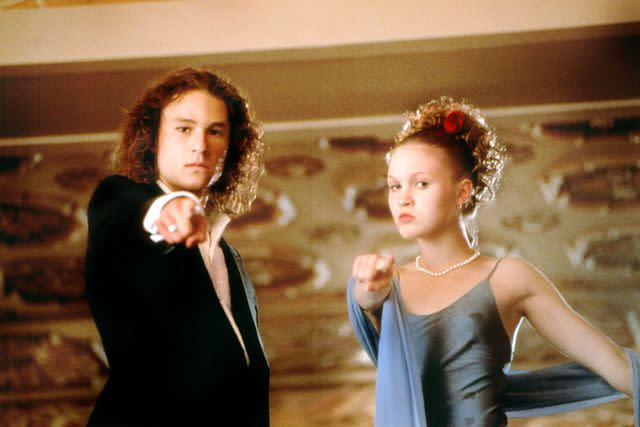Do Shakespeare plays make the perfect rom-com IP? Writers of “10 Things I Hate About You”, “Anyone But You”, and more think so

A Shakespeare play by any other name would smell as sweet...
Twenty-five years ago, 10 Things I Hate About You hit theaters and upended what was possible for Shakespeare adaptations on screen.
The witty, teen retelling of The Taming of the Shrew transferred the Bard’s characters and plotting to a Pacific Northwest high school, kickstarting a trend that’s still going strong today (December sleeper hit, Anyone But You, was based on Much Ado About Nothing). But when screenwriters Karen McCullah and Kirsten “Kiwi” Smith first conceived of 10 Things, it was hardly de rigeur.
Sure, West Side Story was based on Romeo and Juliet, and Akira Kurosawa loved to use the Bard as inspo. Still, the idea of a contemporary rom-com derived from a Shakespeare play was fairly unusual. Kenneth Branagh rose to fame for adapting Shakespeare to the screen, but he performed the plays as written.

Buena Vista Pictures/Everett; Dimension Films/ Everett; Brook Rushton/Sony
Heath Ledger in '10 Things I Hate About You'; Kirsten Dunst in 'Get Over It'; Sydney Sweeney in 'Anyone But You'In fact, it was Jane Austen, not Shakespeare, who initially inspired Smith and McCullah. “We loved Clueless,” says McCullah, speaking of the 1995 twist on Austen's Emma. “So, we decided to find a classic to adapt, and we happened upon Taming of the Shrew at the suggestion of one of Kirsten's friends. It was an exhaustive search, trying to find a myth, a fairytale, a fable, whatever it was. We were going to bookstores, looking at libraries, reading CliffsNotes, and doing all kinds of cute, old-fashioned things like that.”
But Shrew ended up having everything they were looking for. “This battle of the sexes and a girl who men thought they were going to be able to tame, and then were surprised to find out they can't, appealed to us,“ says Smith. “It seemed like this could take place at any time."
That last bit was key, as the duo considered gender-swapping the roles, making Patrick (Heath Ledger) the shrew and Kat (Julia Stiles) his tamer. “I was like, ‘It should be reversed and the guy is the shrew,'" remembers Smith. "And then Karen, rightly, was like, ‘That's impossible because all boys in high school are shrews and no one cares.’ The original really works because there's always going to be boys who think that girls are shrews.”
From there, they wrote a version that was essentially a beat-for-beat reimagining of the play. “Our first draft of 10 Things was very, very long because there was an extra plot in Taming of the Shrew that we had put in with some other guy characters,” says McCullah. “And then we realized, ‘Oh, we're going to have to cut some things here. This is a 200-page script.’ But there's a lot of Shakespeare in that script for sure.”

In addition to sprinkling in Easter eggs via place names, brands, and more, McCullah and Smith also turned to other Shakespearean texts to help inform their writing. “I had a big book of Shakespearean sonnets that I went through with a highlighter,” details McCullah. “I would just take certain turns of phrase that he used and add those to dialogue.”
“We enjoyed having all that detail and texture to play with,” adds Smith. ”We were bedazzling with Shakespeare.”
Nowadays, almost nothing gets made in Hollywood without proven IP — be it a best-selling novel, a pre-existing hit franchise, or a comic book. But when McCullah and Smith were writing, studio executives weren't as concerned with that. “We were lucky to be in the early days of that,” says Smith. “Dare I say, trailblazers?”
She dare. When 10 Things I Hate About You opened on March 31, 1999, it debuted at No. 2 behind The Matrix and earned mostly positive reviews. But it also launched the careers of its young leads and has since become a beloved classic that even spawned a TV show of the same name. Yet, its most enduring legacy has perhaps been the trend of other modern Shakespeare adaptations following in the scratches of its quill (or gel pen, as it were).

R. Lee Fleming Jr., who wrote Get Over It, a high school retelling of A Midsummer Night’s Dream, tells Entertainment Weekly that the studio, Miramax, asked him to give his pre-existing script a Shakespearean makeover due to the success of 10 Things I Hate About You.
“I started writing Get Over It in college, as it was originally called Getting Over Allison,” he explains. “There was no Shakespeare, there was no musical element, no one was putting on a show. It was just a straightforward teen comedy. There was a big meeting [at Miramax], and they said, ‘Okay, we want to make this, but we want to make a lot of changes.’ One of the changes was they wanted for them to be putting on a Shakespeare production."
So, Fleming started searching for a play that contained elements that mirrored, to whatever degree, what he had already written. Once he found a match, "Then I completely rewrote the script to add the play," he explains. "The shape stayed basically the same, but it had this whole other idea superimposed over it.”
Not only is the basic plot of Midsummer at play in the romances at the heart of 2001's Get Over It, but to make things extra-meta, the teens are also rehearsing and putting on a play called A Midsummer Night’s Rockin’ Eve, a musical version of the late-16th-Century work. “Doing a Shakespeare play within something that's adapted from a Shakespeare play created a lot of opportunities for meta wackiness,” reflects Fleming. “I'm glad that we wound up taking that path. That made it different from some of the other adaptations.”

Dimension Films/ Everett
Kirsten Dunst and Mila Kunis in 'Get Over It'Indeed, while 10 Things acknowledges the existence of Shakespeare, and Kat’s friend, Mandella (Susan May Pratt) idolizes the Bard, it doesn’t call attention to The Taming of the Shrew itself. However, it does bring Shakespeare’s sonnets into the mix, particularly in Kat’s climatic titular monologue.
Though Fleming reverse-engineered Get Over It to include a Shakespeare influence, similar to McCullah and Smith, he did plenty of research to ensure the references were sound. “I was familiar with A Midsummer Night’s Dream from high school,” he says. “But I definitely went to the store and consulted a lot of Shakespeare for Dummies type books.”
The studio also sent Fleming to a 1999 production of Midsummer at Los Angeles’ Ahmanson Theatre, which starred Richard Thomas (The Waltons) as Puck and was directed by Sir Peter Hall. “I don’t know how helpful that was,” he quips. “But I got to see a free show and we had very good seats.”
For Fleming’s part, he’s not surprised Shakespeare plays remain such a popular source material. “The relationships are timeless and relatable,” he muses. “That's where everything started. Plus, it's free. It’s in the public domain, so they don't have to pay anybody.”

While Get Over It was far from as popular as 10 Things, it kept the trend going, to the point that McCullah and Smith found themselves revisiting the notion with 2006’s She’s the Man, based on Shakespeare’s Twelfth Night. In this instance, the duo was brought on to write new drafts of a spec script. They’d already done a production polish on the Amanda Bynes vehicle What a Girl Wants, and it was Bynes who requested they join the She’s the Man team. Yet, returning to the Bard was the last thing they expected.
“We didn't realize we were entering into a little mini cottage industry, but I'm really proud of the way we did," says Smith. "We were just two girls trying to kick the doors in and write a great teen comedy.”
Adds McCullah:” I don't think either of us were necessarily hardcore Shakespeare scholars. It's really cool that our legacy somehow makes it seem like we were. We were even interviewed by the BBC as if we were. There was a Shakespeare special that they did about adaptations.”

Dreamworks Skg/Kobal/Shutterstock
Amanda Bynes in 'She's the Man'They may not be scholars, strictly speaking, but they are inspiring others to follow in their footsteps. Now, a new generation who grew up watching films such as 10 Things I Hate About You, Get Over It, and She’s the Man are crafting their own adaptations. Ilana Wolper, who co-wrote Anyone But You with director Will Gluck, based the new rom-com on Much Ado About Nothing — and her interest in Shakespeare started with McCullah and Smith’s scripts.
“I am the character in 10 Things I Hate About You, who has a poster of Shakespeare in her locker," Wolper jokes. "I definitely fell in love with Shakespeare because of movies like that and not necessarily because of learning about Romeo and Juliet in sixth grade or having to play Brutus in my English class’ Julius Caesar production."
As for why she chose Much Ado to adapt, she says the play was always her favorite: "It's the original rom-com, so it feels like the perfect Shakespeare play to take and turn into a contemporary rom-com, like those ones that I really loved and that I saw over and over again.”
Similar to Smith and McCullah, Wolper says her early drafts hewed much more closely to the source material. “Ultimately, when I started to strip it down and looked at it, the thing that felt the most modern and exciting was two people who had a previous relationship that had gone south,” she notes. This is how she created Ben (Glen Powell) and Bea (Sydney Sweeney), who share a great night together before a misunderstanding sparks a mutual loathing.

Brook Rushton/Sony
Glen Powell and Sydney Sweeney in 'Anyone But You'Wolper then eliminated the more dramatic Claudio-Hero plot, which finds Hero faking her own death after Claudio publicly jilts her. Though it is still a relative’s wedding that serves as the backdrop for bringing the lovers together — and Wolper decided that her characters would have enough self-awareness to cotton onto the tricks their friends and family were playing on them.
"Modern-day characters are going to be smarter,” Wolper says. “It's a little bit easier to figure these things out. It makes sense that they would uncover the plot but then decide to engage in it anyway for their own personal gain. It's not the classic miscommunication because obviously you're suspending disbelief when it's Shakespeare and it's a play from the 1500s. They're modern characters and they live in an age of rom-coms, and so they knew what their friends are trying to do.”
Wolper herself has a theory as to why the Bard is such ideal source material for contemporary rom-coms. “He's so dramatic,” she says. “But I also think that there's something really special to using these texts that we usually have to read in school and turning them into something that feels modern and relatable. They're classic stories, they're original plots. They are very, very simple and they work. It’s exciting to have the source material be something that was established a long time ago and make a thing that enhances the understanding of it.”

10 Things I Hate About You sparked a series of films, including 2001’s O and Get Over It, extending through to She’s the Man. But what of Anyone But You? Could it be the movie that launched a thousand Shakespeare-inspired rom-coms 25 years later? Wolper sure hopes so.
"I'm definitely not done,” she says. "I want to make my way through the whole canon. I'm like, ‘Let's do Macbeth as a rom-com.’ I'll try it. Shakespeare is harder to crack, and sometimes it feels like the comedies have been done, but I've read so many different novels that are adaptations of Shakespeare, and I'm hopeful that we'll have a little bit more of a renaissance.”
In addition to what she describes as a dark rom-com based on Macbeth, Wolper also wants to see a version of Twelfth Night starring Kristen Stewart, regardless of whether she's the one to write it. “It’s so trans-coded and it's so queer,” she explains.
It’s not just Wolper who's eager for more. McCullah and Smith say they would also be open to revisiting the idea of contemporary Shakespeare retellings and have, in fact, tried to brainstorm ideas for something based on Two Gentlemen of Verona. “Every time we really dig into it, we're like, ‘Maybe that's not the strongest one,’” says Smith. “There are some big plot issues.”
But hey, if you can make taming a shrew funny in a modern context, anything's possible, right? After all, to paraphrase the man himself, if Shakespeare plays be the food of love, play on.
Want more movie news? Sign up for Entertainment Weekly's free newsletter to get the latest trailers, celebrity interviews, film reviews, and more.
Related content:
How Anyone but You navigated shark-infested waters and rom-com tropes
Watch Julia Stiles get emotional as she reenacts iconic 10 Things I Hate About You scene
Read the original article on Entertainment Weekly.


